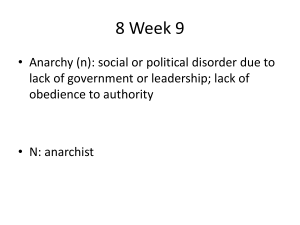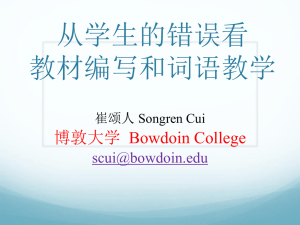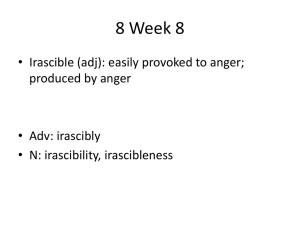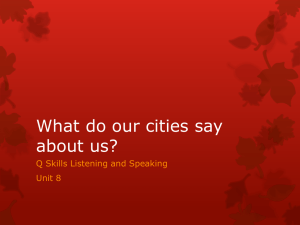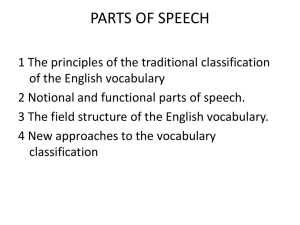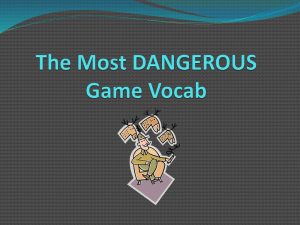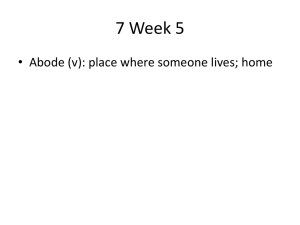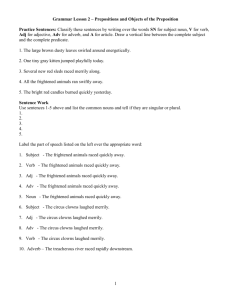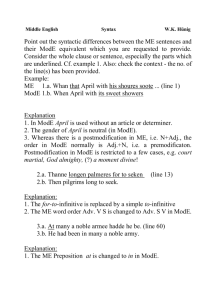Unit 4 词类转化
advertisement
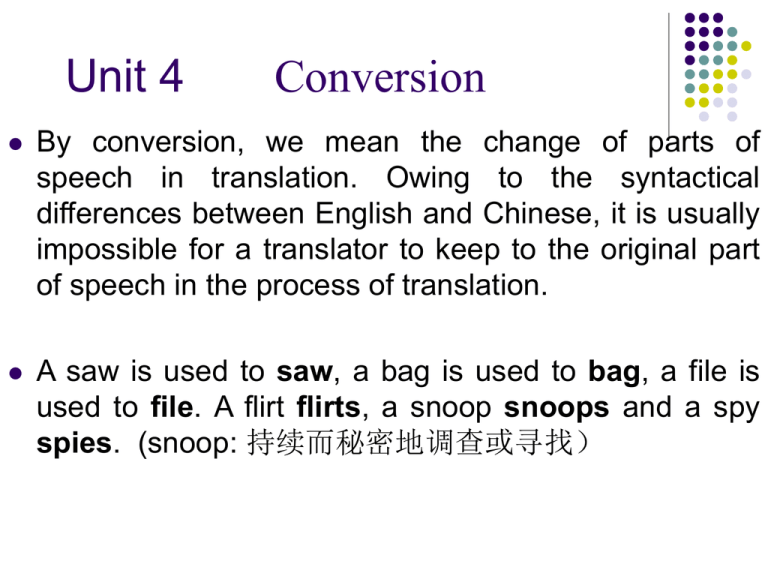
Unit 4 Conversion By conversion, we mean the change of parts of speech in translation. Owing to the syntactical differences between English and Chinese, it is usually impossible for a translator to keep to the original part of speech in the process of translation. A saw is used to saw, a bag is used to bag, a file is used to file. A flirt flirts, a snoop snoops and a spy spies. (snoop: 持续而秘密地调查或寻找) I. Conversion into verbs 1. Nouns into verbs: 1) 一些习语中的主体名词可以转换成动词 eg. have a rest, go for a walk A. We don’t have any idea when the boy was born. B. She is too tired to have the faintest desire to dance. 2) 含有动作意味的名词可以转换成动词 A. The abuse of drugs has become one of America’s most serious social problems. B. A view of Fuji Mountain can be obtained from here. 3) 由动词派生出来的名词可以转换成动词 A. The government called for the establishment of more technical schools. B. The new situation requires the formation of a new strategy. C. An acquaintance of world history is helpful to the study of current affairs. 读一点世界史,对学习时事是有帮助的。 D. I call for cooperation in the economic and technical sectors among the countries the world over. 我呼吁世界各国在经济、技术方面进行合作。 2. Prepositions into verbs 1) At noon, he came home for lunch. 他中午回家吃午饭。 2) The president took the foreign guests about the campus. 校长带外宾们参观校园。 3) Party officials worked long hours on meagre food, in cold caves, by dim lamps. 党的干部吃的是有限(微薄)的食物,住的是寒 冷的岩洞,用的是昏暗的油灯,他们却长时间地工 作。 3. Adjectives into Verbs Many English adjectives after a link verb indicating one’s consciousness, feelings, emotions, desires, etc. are always converted into Chinese verbs. 1) I am so grateful to my father for his continuous encouragement during my childhood. 我非常感激父亲,因为在我小时侯他总是不断地 鼓励我。 2 ) They are not content with their present achievements. 他们不满足于他们现有的成就。 3) We are especially grateful to you for arranging the meeting for us with the Machinery Trading Delegation at such short notice. 我们特别感谢你们在时间那么短促的情况下安排我们 同机械交易团的成员们会面。 4)The prospect of earning five thousand dollars a month had stimulated the sporting (冒险的,没有 把握的)and commercial instinct of the villagers. 眼看能每个月赚五千美元,村里人人都动了碰运气和 捞钱的念头。 4. Adverbs into verbs 1) Our holiday is three weeks away. 离我们的假期还有3个星期。 2) When will he be back? 他什么时候回来? 3) The boy told me that his mother was out. 那个男孩告诉我他的母亲出去了。 5. Conjunction into Verbs 1) Eight and seven is fifteen. 8加7等于15。 2) Winter is the fourth and last season in a year. 冬季是一年中第四个也是最后一个季节。 II. Conversion into Nouns 1. Verb into Nouns 1)英语中的被动语态在翻译成汉语时,原被动 句中的谓语动词可根据需要转换成汉语的名词, 与“遭到”、“受到”等动词连用。 A. His image as a good student was tarnished(玷污). B. He was snubbed(冷落) by those topranking officials. 2)名词派生出来的动词,为符合汉语表达习 惯,可将其还原成名词来译。 A. He was blacklisted and lost his job. B. Such materials are characterized by good insulation and high resistance to wear. 这些材料的特点是:绝缘性好,耐磨性强。 2. Adjective into Nouns Adjectives with the definite articles to indicate categories of people, things, or adjectives used as predicative to indicate the nature of things may also be converted into nouns. 1) They are going to build a school for the blind and the deaf. 他们将为盲人和聋人修建一所学校。 2) Beg filed an urgent story to his newspaper in London, little realizing that he was about to become part of a new journalistic legend on Fleet Street. 贝格往伦敦报社发了一条急电,当时根本没想到自 己会成为舰队街新闻界一件奇闻中的有关人物。 III. Conversion into Adjectives 1. Noun into adjective 有时名词在句子中充当表语,前面通常有冠词, 翻译时可转换为形容词。 A. This experiment was a great success. B. Independent thinking is a necessity in study. 2. Adv. into adj. 有些副词是由形容词派生出来的,可转译为形 容词。 1) They were deeply impressed by what he did in the critical moment. 他在关键时刻的行为给他们留下了深刻的印象。 2) Boys think differently from girls. 男孩子的思维方式和女孩子是不同的。 IV. Conversion into Adverbs 1. Nouns into adv. 1) John and Kate, the instant they were married, set out in great haste for Venice. 刚行完婚礼,马上匆匆忙忙地动身到了威尼斯。 2) She had the kindness to show me the way. 她好意地给我指路。 2. Adj. into adv. 1) He whispered a hurried good-bye to his host. 他匆匆地向主人轻声道别。 2) It was a clear and unemotional exposition of the President’s reasons for willing to begin a Chinese-American dialogue. 这篇发言清楚明白、心平气和地说明了总统希望 开始中美对话的原因。 Exercises 1. With the passage of time, her admiration for him grew more and more. 随着时间的消逝,她对他越来越敬慕(钦佩)。 (n.→v.) 2. We are enemies of all wars. 我们反对一切战争。(n.→v.) 3. My suggestion is that he should quit smoking at once. 我建议他立刻戒烟。(n.→v.) 4. The thief made a trembling confession of his wrongdoing. 小偷颤抖着交代了自己干的坏事。(adj.→adv.; n.→v.) 5. Observers have commented favorably on the achievement you have made. 观察家们对你取得的成就给予了很好的评价。 (v.→n.; adv.→adj.) 6. He is a lover of Chinese paintings. 他热爱中国画。(n.→v.) 7. Most students behave respectfully towards their teacher. 大部分学生对老师态度很恭敬。(v.→n.; adv.→adj.) 8. At the sight and sound of our jet planes filled me with special longing. 看到我们的喷气式飞机,听到隆隆的声音, 真令人特别神往。(n.→v.) 9. He is a perfect stranger in the city. 他对这城市完全陌生。(n.→adj.) 10. They gave him a hearty welcome. 他们很热忱地欢迎他。(adj.→adv.) 11. Please give an accurate translation of this sentence. 请把这句话确切地翻译出来.(adj.→adv. n →v.) 12. He came to me with a luggage. 他拿着行李向我走来。(prep. →v.) 13. She came to my home for help. 她来到我家,请求帮助。(prep. →v.) 14. These chemical engineers don’t guarantee anything. 这些化学工程师不做任何保证。(v. →n.) 15. Originally he was from Sweden. 他的原籍是瑞典。(adv. →n.) 16. Mr. White with great cheerfulness told her that he had good news to communicate. 怀特先生兴高采烈地说,他带来了很好的消息。 (n. →adv.) 17. Numerous abstentions marked the French elections. 无数的弃权是法国竞选的特点。(v. →n.) 18. These handicrafts are very popular with foreign friends. 外国朋友很喜欢这些手工艺品。(adj. →v.) 19. The old hunter is a good skier. 这位老猎人滑雪滑得很好。(n. →v.) 20.Animals become indifferent to their young as soon as they can look after themselves. 动物,一旦它们的后代能够自己照料自己,它们 就不管了。(adj. →v.)

